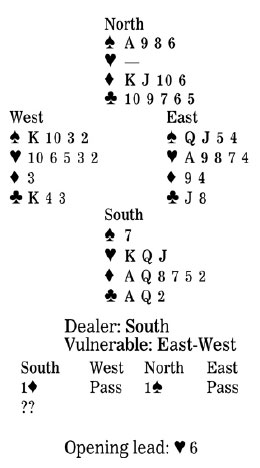With a decision, analyze alternatives
By Phillip Alder ( China Daily ) Updated: 2017-08-05 07:46:36Henry Kissinger said, "The absence of alternatives clears the mind marvelously."
During a bridge deal, if there is only one sensible bid or play, you will feel marvelous. However, when there are alternatives, you need to think clearly.
In today's deal, look at the South hand. He opens one diamond, and partner responds one spade. What should South rebid? What are his alternatives?
South has four choices: two hearts, two no-trump, three diamonds and three no-trump.
Two hearts is a strength-showing reverse; it is feasible, but South does not have four hearts. A fake reverse should be a last-choice desperate measure. Two no-trump promises a balanced hand; North will expect at least two spades. Three diamonds is a big underbid, indicating 14-plus to 17-minus points. That leaves the right rebid: three no-trump. In principle, this shows 18-19 points, at least six good diamonds, stoppers in the unbid suits and, often, a singleton in partner's suit - nearly perfect.
At the table, over three no-trump, North rebid four diamonds, recognizing the power of his good trump fit and two first-round controls. South control-bid five clubs, and North jumped to six diamonds.
West led the heart six, second-highest from a weak suit. Declarer ruffed on the board, cashed the diamond king and played a club to his queen. This lost, and West shifted to a spade, but South won with dummy's ace, drew East's last trump with the diamond jack and led the club 10. When East covered with the jack, declarer claimed.

|
|
|
|
|
|
|
|

























 Raymond Zhou:
Raymond Zhou: Pauline D Loh:
Pauline D Loh: Hot Pot
Hot Pot Eco China
Eco China China Dream
China Dream China Face
China Face






